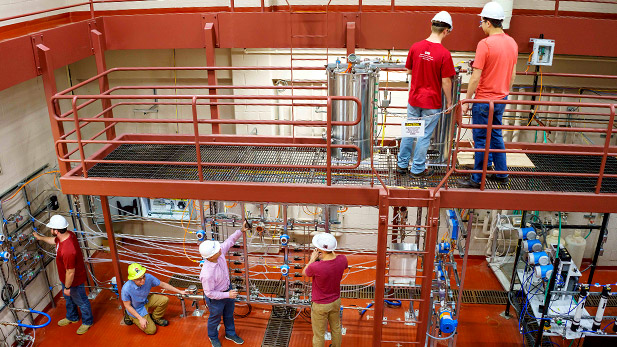New Fluid Measurement Unit Flows from Chemical Engineering, Endress+Hauser Partnership

Students are using instruments in the new Fluid Flow and Process Measurements Experimental Unit in the senior-year laboratory sequence, an advanced process control course, along with special projects and topics courses.
A decade-long partnership between the Department of Chemical Engineering and Endress+Hauser is providing leading-edge industry-standard equipment to chemical engineering students preparing to solve some of the world’s toughest challenges.
The department’s new Fluid Flow and Process Measurements Experimental Unit incorporates 25 modern process instruments that measure flow rate, level, pressure and temperature across a piping network – key elements in every industrial chemical process. These instruments communicate through a laboratory-wide distributed control system through four different digital communication tools. The system also includes 40 valves, 250 feet of stainless steel tubing and 300 feet of electrical and communication cables.
The total investment by Endress+Hauser, Rose-Hulman and alumnus Mac Fehsenfeld is approximately $300,000 in monetary assistance, equipment and special computer software donations, installation coverage, faculty and staff training, and engineering and project management support.
This new unit, part of the High Bay Laboratory in Olin Hall, will be used by students in the senior-year laboratory sequence, an advanced process control course, along with special projects and topics courses. Faculty also will use the equipment in research projects with undergraduate- and graduate-level students.
“Our excellent laboratory facilities continue to provide students with practical, hands-on education in a dynamic, industrially relevant atmosphere. They are one of the key defining features of our world-class program,” says Adam Nolte, department chair.
Endress+Hauser’s U.S. headquarters is located in Greenwood, Ind. The company is a global leader in measurement instrumentation, services and solutions for industrial process engineering. Beyond instrumentation, the automation supplier provides services and solutions to help its customers improve their processes as well as address some of the world’s biggest challenges. This includes ways to bring clean water, available energy, affordable food and improved health care to people throughout the world.
“Engineers, like those produced at Rose-Hulman, will be solving the world’s toughest challenges. Their skills transfer seamlessly to all of the realms of water purification and the manufacture of fuels, food and medicines,” states Don Cummings, Endress+Hauser’s technical talent development manager. “We engage where we can help ensure that engineering education stays industrially relevant, and Rose-Hulman has always been very receptive to that concept.”
Endress+Hauser’s partnership with Rose-Hulman began more than 10 years ago with equipment being donated for the Department of Chemical Engineering’s Unit Operations Laboratory. The laboratory has 15 pilot plant-sized project workstations. Each rig provides hands-on experience in learning the fundamentals of heat transfer, distillation, membrane separations and fluid flow, along with important practice in process documentation.
Nolte points out that the fast-moving world of field instrument technology requires educational institutions to rely on industry feedback and support in order to incorporate the latest high-impact breakthroughs and new technologies into the curriculum.
Industry partnerships also provide field trips and educational programs at production and training facilities, along with up-to-date training videos and other materials showcasing industry best-practice procedures, and professional development opportunities for faculty to keep abreast with current industrial practice.
“Strong corporate ties to Endress+Hauser and other organizations continue to ensure the relevance of our educational goals, while giving our students and faculty the opportunity to interact with and learn from industrial leaders in key areas important for chemical engineering,” says Nolte. “The quality of our laboratory facilities is a direct result of the dedicated support of our alumni, friends and corporate partners. We are extremely grateful for their time, financial support and equipment gifts.”
Fehsenfeld, a 1952 chemical engineering alumnus, retired after serving as chief executive officer of the Crystal Flash Petroleum Corporation, based in Indianapolis.
Twenty Rose-Hulman students joined faculty and staff members from a variety of academic departments in the planning, design and installation of the Fluid Flow and Process Measurements Unit, according to chemical engineering professor Atanas Serbezov, who worked with Endress+Hauser on the project. He also has been a consultant for Eli Lilly and Company, and has industry experience with Honeywell and Praxair.
Swagelok of Indiana and Cornerstone Controls, both with offices in Indianapolis, provided technical support for installation and calibration of the laboratory’s many equipment features.
Rose-Hulman awarded the nation’s first degree in chemical engineering in 1889, and the chemical engineering program is consistently ranked among the nation’s best at undergraduate engineering colleges and universities.